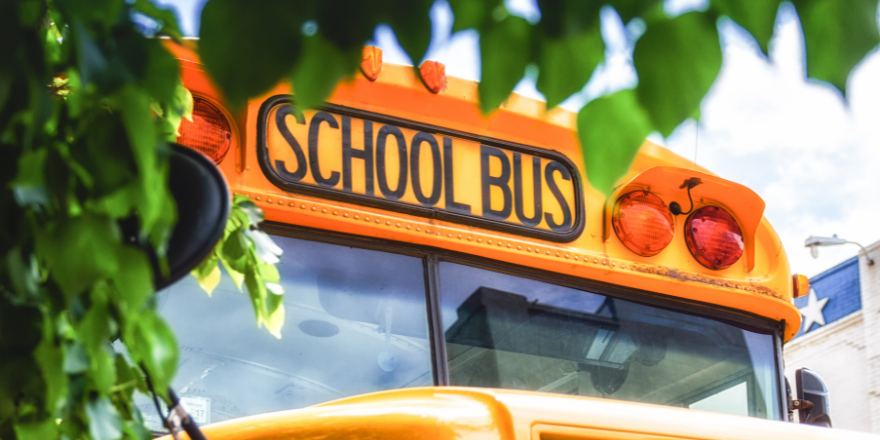When we talk about environmentally friendly school bus programs, electric vehicles tend to dominate the conversation. But from a fleet management perspective, there’s a lot more to sustainable transportation practices than just switching to EVs. From driver training to data analysis, school bus contractors can adopt a range of practices to become more energy-efficient and, with that, eco-friendly. Here are five ways contractors and transportation directors can move toward cleaner transportation programs:
Route optimization
We’ve discussed optimized routing before, including its notable impact on fuel efficiency. Optimized routing ensures that school buses take the best route to their destinations, minimizing fuel usage and environmental impact.
Right-sizing the fleet
Evaluating your fleet’s size and composition, relative to a district’s needs, is essential. When we approach fleet management as a dynamic process, we’ll find that the appropriate number and mix of vehicles may shift over time, in step with the changing demographics of our educational partners.
To ensure that the number and type of vehicles meet operational requirements without excess or shortages, top-tier school bus contractors know how to continuously right-size their fleets. This optimization reduces fuel consumption, emissions, and overall environmental impact.
Here are a few examples of how school bus contractors can right-size their fleets:
Analyze route efficiency
Conduct a thorough analysis of bus routes, taking into account student density, traffic congestion, and travel times. These are all important factors on their own in determining fleet size and composition, but through an eco-friendly lens, they all help minimize a school bus contractor’s environmental footprint while on the road.
Evaluate student ridership
Contractors can analyze student ridership data to determine which buses may consistently have low or high numbers of students, then consider reallocating vehicles to distribute ridership more efficiently. These efficiencies can help boost fuel savings and minimize vehicle emissions each day.
Collaborate with school administrators and other stakeholders
Engage with school administrators, transportation coordinators, and other educational stakeholders to stay abreast of potential changes in student enrollment and ridership. Collaboration ensures that right-sizing decisions consider the needs of the school community while maintaining high standards of safety and service.
Telematics and fleet tracking
Using telematics and fleet tracking technology allows student transportation providers to monitor vehicle performance in real time. These systems provide insights into fuel efficiency, idling time, and driving behavior. By analyzing the data, school bus contractors and fleet managers can identify areas for improvement and implement strategies to reduce fuel consumption and emissions.
A telematics system can play a significant role in helping school bus fleets become more environmentally friendly, including:
Fuel efficiency monitoring
Telematics systems can provide otherwise hidden insights into excessive fuel consumption. By monitoring vehicle diagnostics, fleet managers can proactively identify inefficiencies such as clogged air filters and take corrective measures. This, in turn, can reduce both fuel costs and emissions.
Idle time reduction
Telematics technology can pinpoint excessive idle times that contribute to unnecessary fuel consumption and emissions. By identifying school buses with unusually long idle times, fleet managers can implement strategies such as training that encourages drivers to shut off engines rather than idle.
Driver behavior
Telematics also can monitor driver behaviors such as quick acceleration or hard braking, both of which contribute to fuel usage and, in turn, emissions. By identifying these behaviors, fleet managers can provide targeted training and coaching to promote more eco-friendly driving habits, making each ride more environmentally friendly.
Eco-friendly driving techniques
Promoting eco-friendly driving techniques among school bus drivers is a great way to improve fuel efficiency and environmental awareness. Drivers already receive rigorous training, but school bus contractors can offer ongoing education and training programs that emphasize eco-friendly driving techniques, such as:
Smooth acceleration and braking
Gradual and smooth acceleration and braking can significantly improve fuel efficiency. Drivers should avoid rapid acceleration and hard braking, as these actions waste fuel and increase emissions.
Consistent speeds
Excessive accelerating and decelerating result in higher fuel consumption. Maintaining a consistent speed whenever possible helps conserve fuel, as well as creating a more comfortable ride for students.
Driving for traffic and road conditions
By staying aware of their environment and anticipating traffic and road conditions, drivers can adjust their actions accordingly. This can reduce abrupt stops and starts and improve idle times, both of which contribute to reduced emissions.
Transition to alternative-fuel and electric vehicles
School bus contractors have a growing number of environmentally friendly vehicle options, including EVs, buses with high-efficiency diesel engines, and those that run on alternative fuels such as biodiesel, ethanol, or renewable natural gas. EVs in particular can have a substantial environmental impact, as they produce zero tailpipe emissions. By gradually adding EVs and other high-efficiency vehicles to their fleets, school bus contractors can improve their environmental footprint, especially as the technology becomes more accessible and affordable.
By adopting eco-friendly practices like these, fleet managers can reduce overall environmental impact and promote sustainability in their transportation programs. It’s a win not just for school bus contractors, but for the students and communities served as well.
Contact us
If you are a student transportation provider seeking resources for fleet management, reach out to us. We’re ready to build a path to partnership.
American Student Transportation Partners (ASTP) is a national network of reliable student transportation providers. We’re driving the future of student transportation by providing access to education through safe, dependable student transportation programs. Exceptional bus operators choose ASTP because of our innovative approach to partnership, as well as the resources we provide to help “future-proof” their operations.
To learn more about partnering with ASTP, contact Tod Eskra, President, at [email protected] or call (314) 560-5946.

